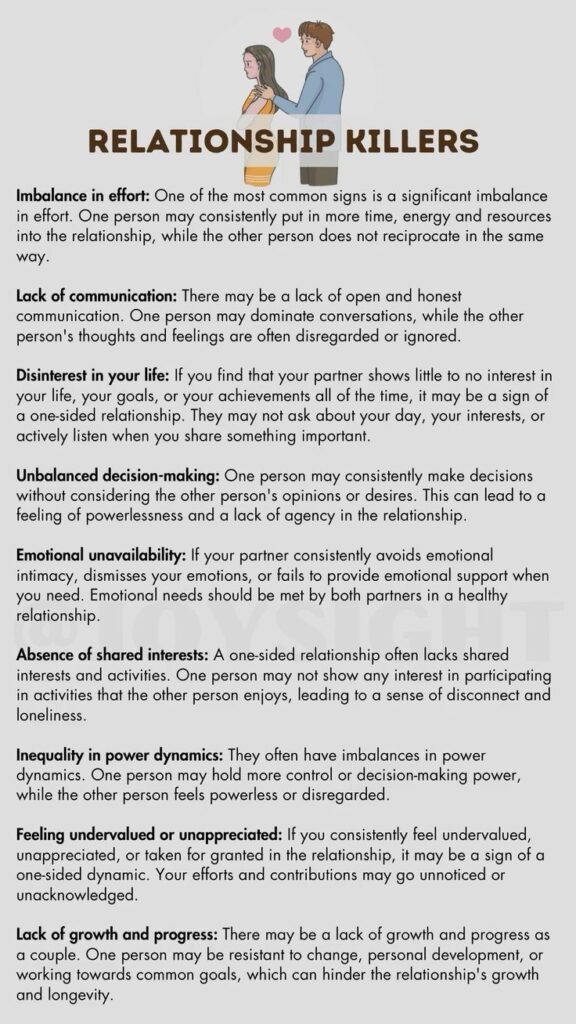In every romantic relationship, maintaining harmony and happiness requires effort, understanding, and mutual respect. However, certain behaviors and habits can slowly erode the foundations of even the strongest partnerships. These “relationship killers” may not always be obvious, but left unchecked, they can cause significant damage. In this content, we explore some of the most common relationship killers, helping you identify and avoid them to protect your connection with your partner.
1. Lack of Communication
One of the most vital aspects of any relationship is communication. When partners stop communicating effectively, it becomes easy for misunderstandings, resentment, and frustration to fester. Whether it’s not sharing feelings, avoiding difficult conversations, or assuming the other person knows what you’re thinking, poor communication creates distance and tension.
Solution: Prioritize open and honest dialogue. Make time to talk about both everyday things and deeper emotions. Active listening, where you focus entirely on what your partner is saying without interrupting or judging, can also help improve communication.
2. Lack of Trust
Trust is the cornerstone of any relationship, but it can be easily broken. Whether it’s due to dishonesty, infidelity, or consistently failing to follow through on promises, lack of trust erodes emotional security. Without trust, intimacy and vulnerability are nearly impossible, causing partners to drift apart.
Solution: Rebuilding trust takes time, consistency, and transparency. Be honest about your thoughts and actions, even when it’s uncomfortable. Show your partner that they can rely on you, and work together to reestablish a strong foundation.
3. Neglect
Neglect can occur when one or both partners stop investing time and energy into the relationship. This might involve not spending quality time together, not showing appreciation, or taking the other person for granted. Over time, neglect can lead to feelings of loneliness and detachment, making it difficult for the relationship to survive.
Solution: Regularly show your partner that they matter to you. Small gestures, thoughtful acts, and spending quality time together can help keep the connection alive. Make your partner a priority, even in the midst of busy schedules.
4. Jealousy and Insecurity
While a little jealousy is normal in any relationship, excessive jealousy and insecurity can quickly become toxic. Constantly questioning your partner’s loyalty, accusing them of things without evidence, or trying to control their actions will suffocate the relationship. Insecurity in one partner can cause emotional exhaustion in the other, leading to frustration and withdrawal.
Solution: Focus on building self-confidence and addressing insecurities individually or through therapy. Discuss your feelings with your partner in a calm, non-confrontational way to seek reassurance and strengthen trust.

5. Unresolved Conflicts
Every couple argues, but how those arguments are resolved makes all the difference. If conflicts are left unresolved or are frequently avoided, resentment builds. Consistently sweeping issues under the rug rather than addressing them head-on can lead to an emotional disconnect, making it harder to resolve future disagreements.
Solution: Approach conflicts as opportunities for growth, not battlegrounds. Address issues as they arise, and focus on finding solutions rather than placing blame. When you disagree, take a moment to calm down before discussing the issue to avoid saying things in the heat of the moment that could cause lasting harm.
6. Disrespect
Respect is crucial in any relationship. Disrespect can take many forms—belittling your partner, making hurtful jokes at their expense, or disregarding their opinions and feelings. Over time, consistent disrespect wears down the sense of equality and partnership, leading to bitterness and contempt.
Solution: Practice empathy and kindness. Be mindful of how your words and actions impact your partner, and always strive to treat them with the same respect you expect in return. Healthy relationships are built on mutual admiration and support.
7. Lack of Intimacy
Physical and emotional intimacy are important for maintaining a close connection with your partner. When intimacy fades, partners can feel disconnected, unloved, or unappreciated. This isn’t just about physical touch—it also includes emotional intimacy, such as sharing thoughts, dreams, and vulnerabilities.
Solution: Foster both emotional and physical closeness. Set aside time for intimacy, whether through physical affection or deep conversations. Intimacy helps build a sense of togetherness and strengthens the bond between partners.
8. Comparisons
Constantly comparing your partner or your relationship to others, whether real or imagined, is damaging. This can manifest as unrealistic expectations shaped by social media or comparing your partner to past relationships. Over time, these comparisons create dissatisfaction and resentment.
Solution: Focus on your unique relationship and what works for both of you. Avoid idealizing other couples or people and celebrate the strengths of your own relationship. Every relationship is different, and no one is perfect.
9. Controlling Behavior
In a healthy relationship, both partners should feel free to be themselves without feeling controlled or restricted. Controlling behavior—whether through manipulation, guilt-tripping, or limiting your partner’s actions—destroys trust and creates a toxic power dynamic.
Solution: Encourage independence and mutual respect. Understand that your partner is an individual with their own needs, desires, and boundaries. Work on fostering a partnership where both people feel free to thrive without fear of control.
10. Emotional Baggage
Unresolved emotional issues from the past can weigh heavily on a current relationship. Whether it’s lingering trauma, unhealed wounds from previous relationships, or personal struggles, emotional baggage can cloud judgment, leading to misunderstandings or disproportionate reactions.
Solution: Acknowledge and work on your emotional baggage. Therapy or self-reflection can help you identify triggers and work through past issues. Be open with your partner about how they can support you, but also take responsibility for your healing.
Conclusion
Every relationship faces challenges, but being aware of these relationship killers can help you safeguard your partnership. By fostering trust, communication, and respect, and by making conscious efforts to address any issues that arise, you can build a strong, lasting connection. Remember, relationships require ongoing work, but the rewards are worth the effort when both partners are committed to growth and mutual support.

